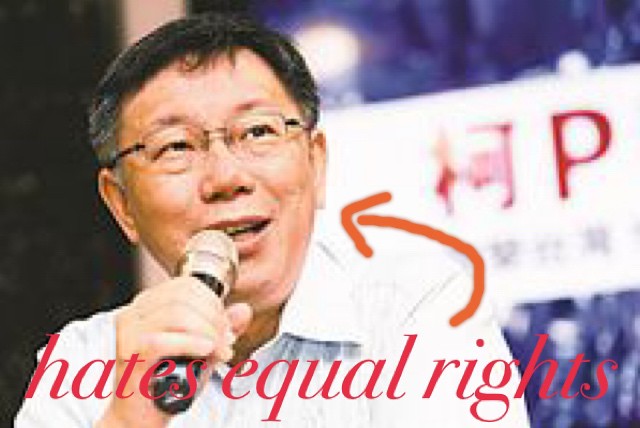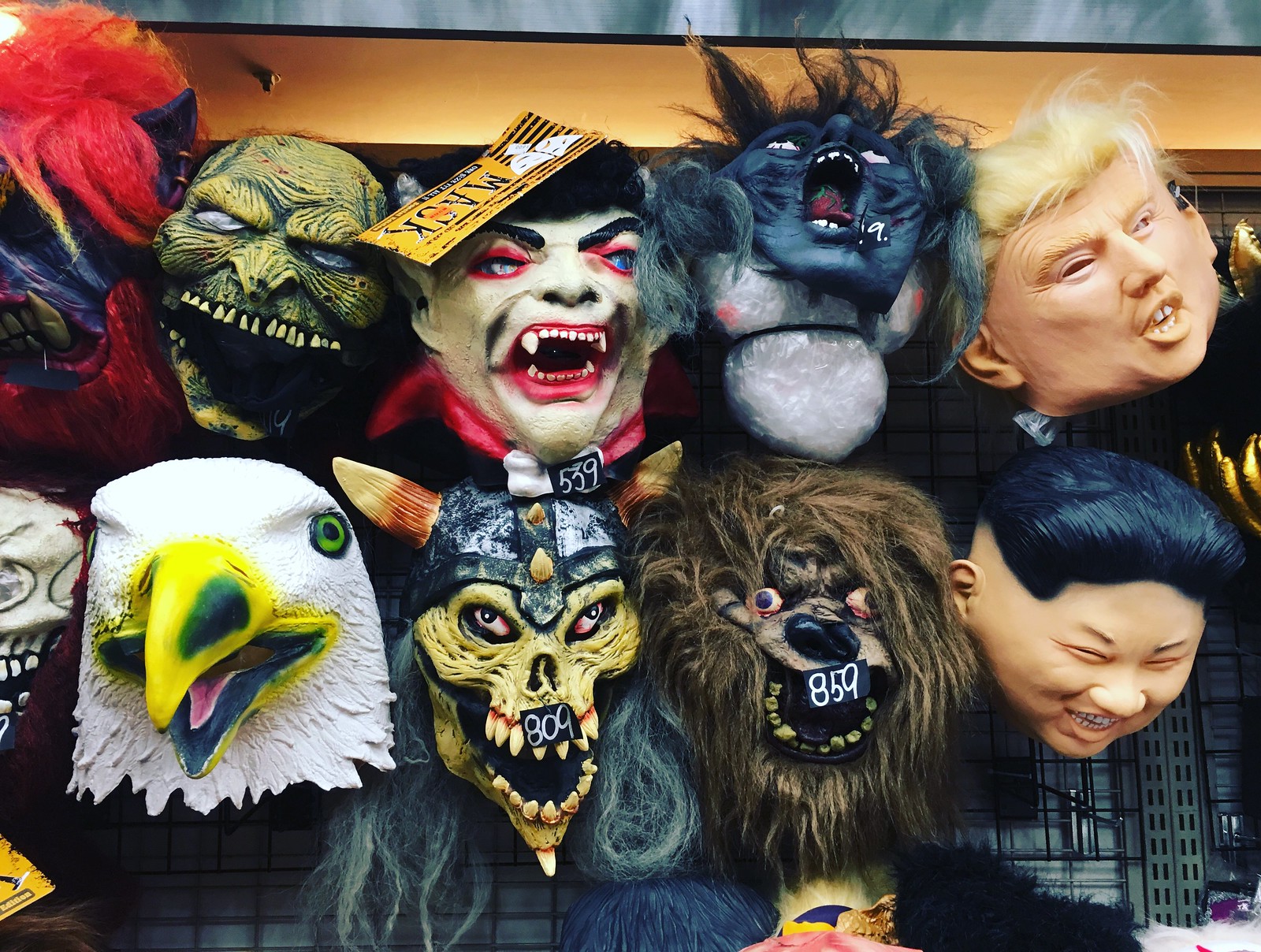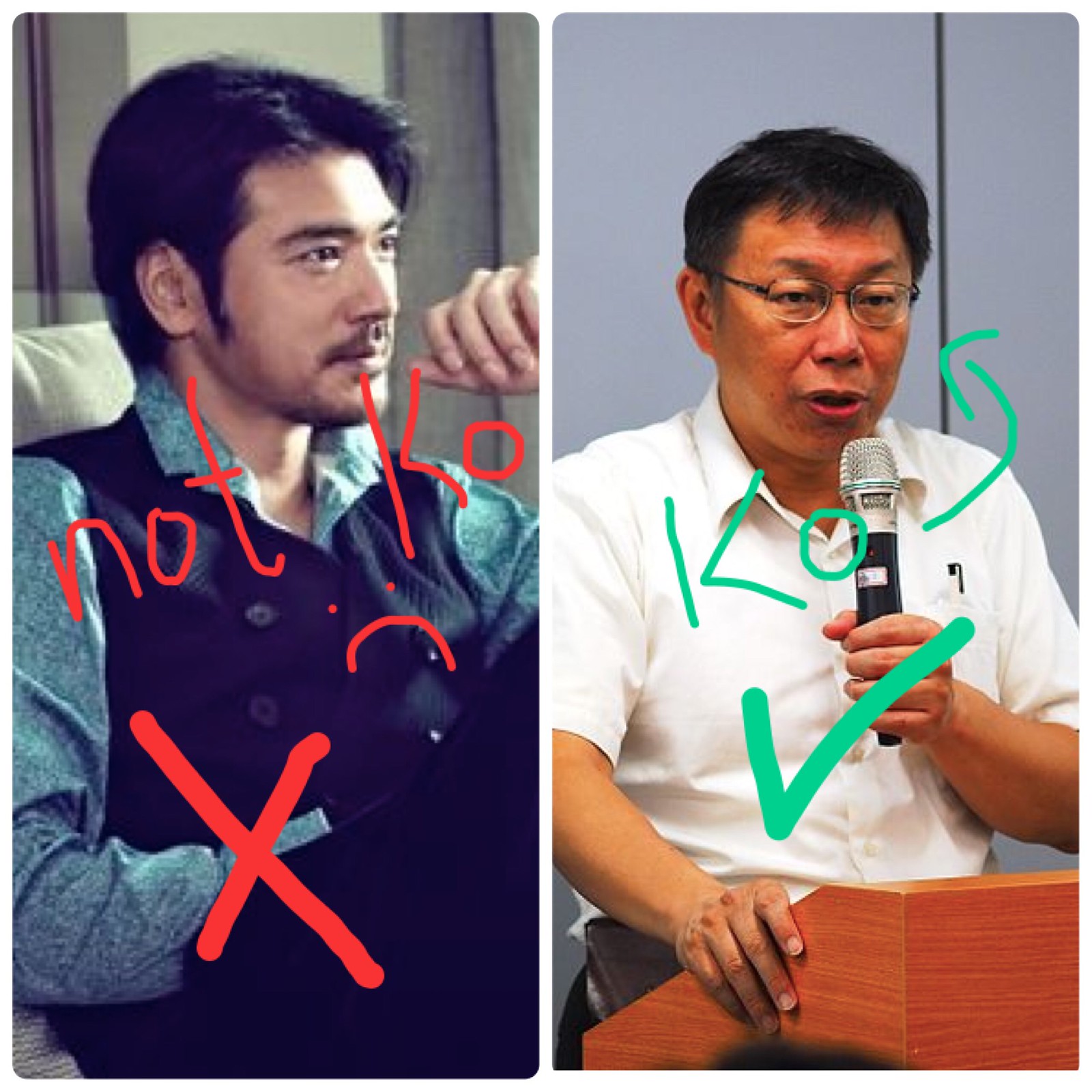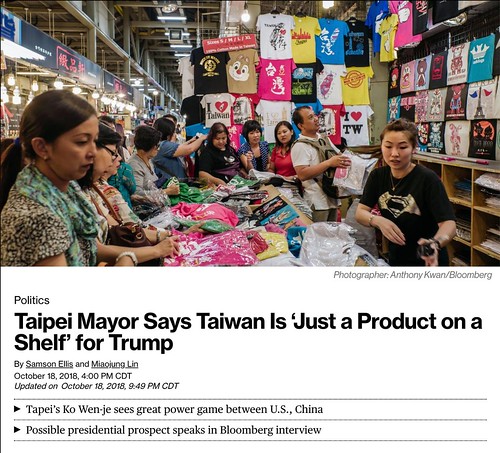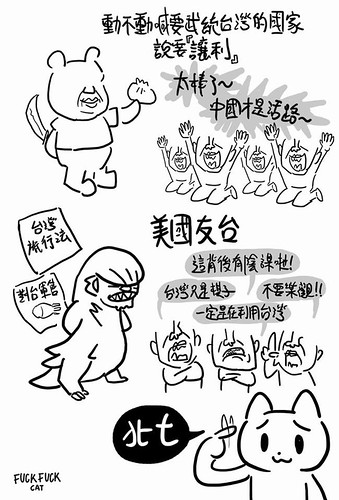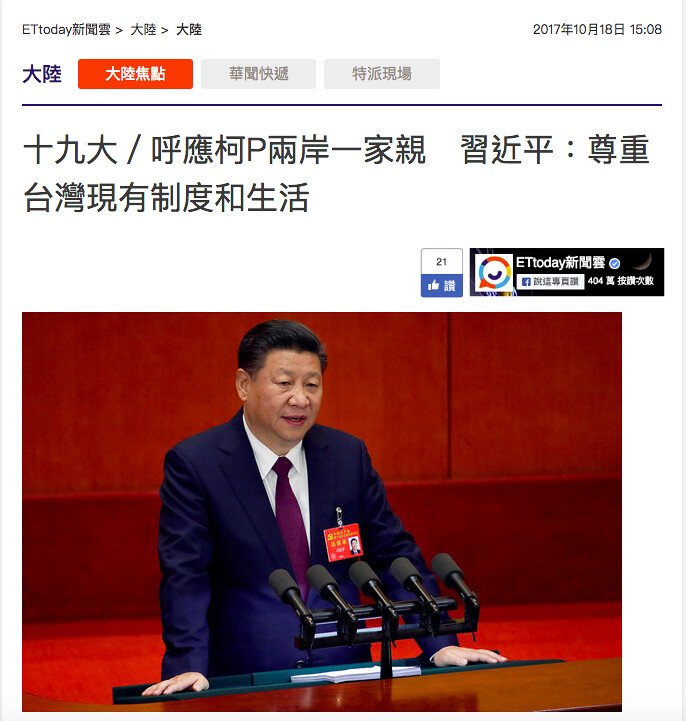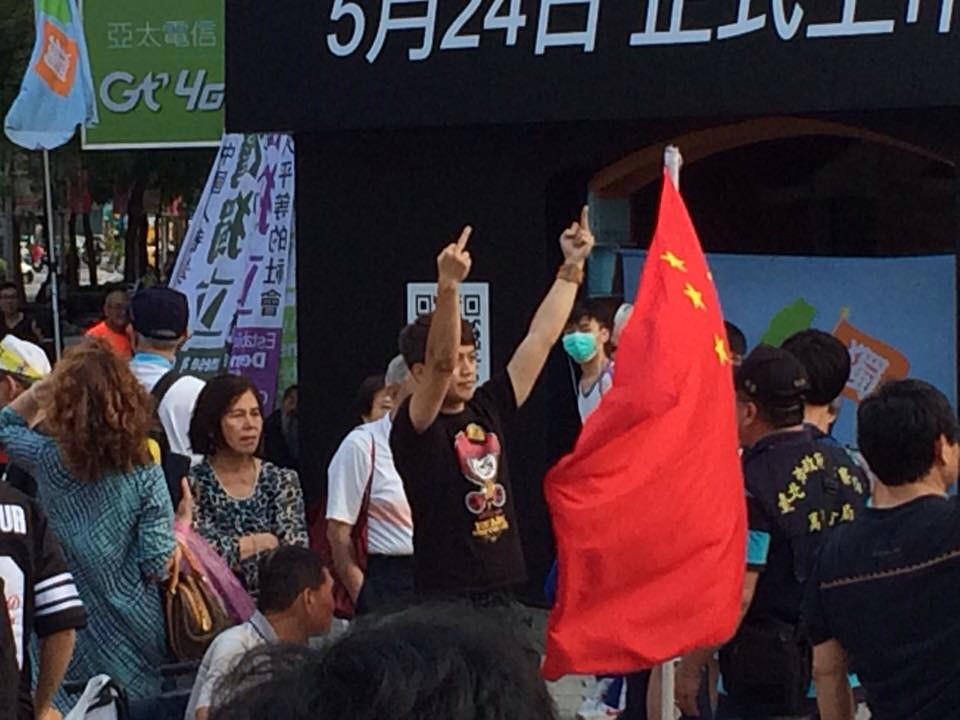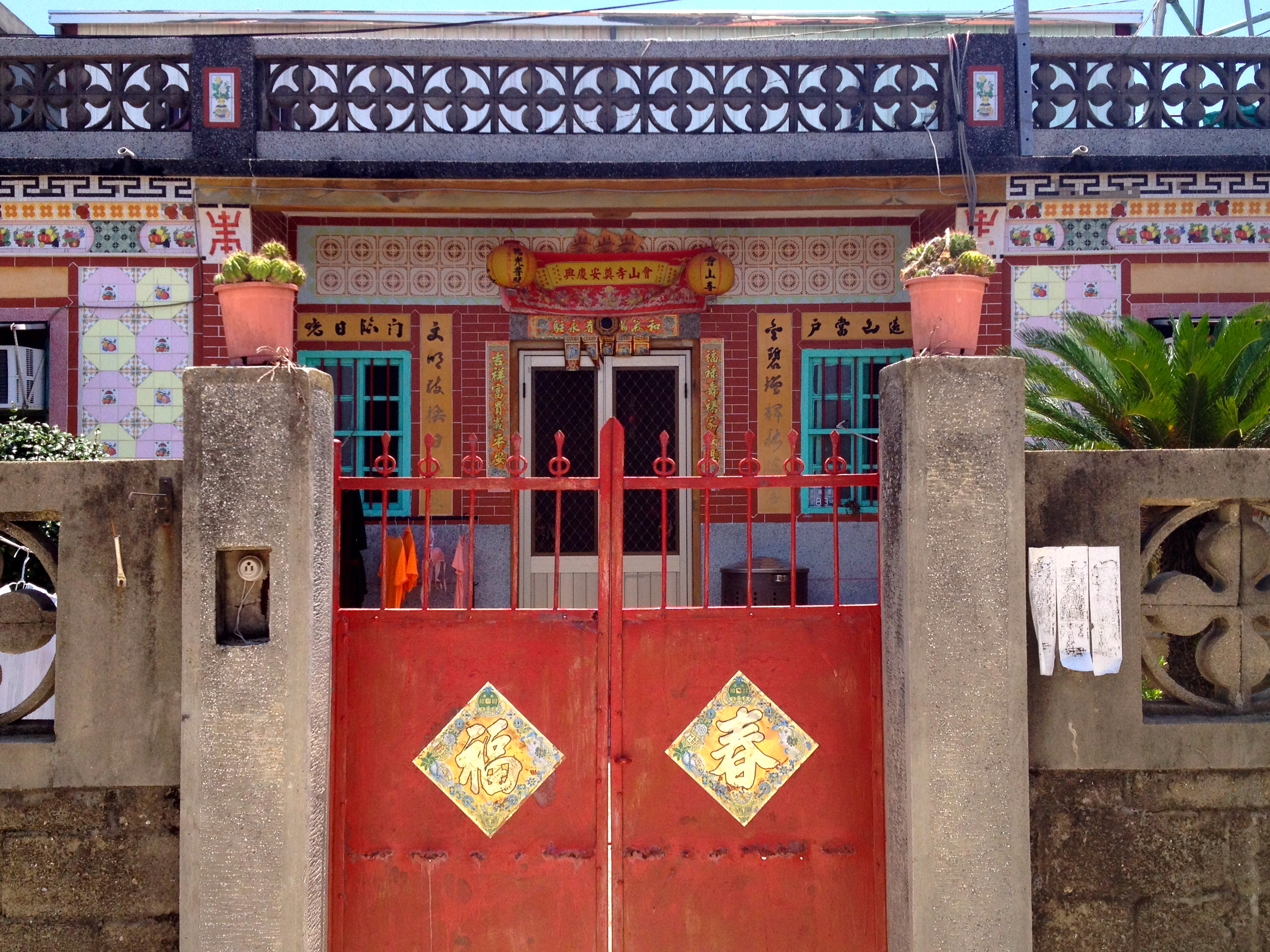
This is a bit of a frankenpost, but we've had a frankenweek in Taiwanese politics.
First, yes, I was wrong about the KMT/TPP dalliance. There's no way Ko was promised the top spot on the ticket if negotiations could fall apart that quickly. Before it turned into a massive clownshow, my Taiwanese teacher's pet theory was that the CCP gave Ma dirt on Ko: there's a reasonably popular notion that Ko was involved in organ harvesting in China. I thought this was unlikely because it has the ring of disinformation, but thought, it doesn't have to be that to still be dirt.
Anyway, I was wrong, and the blackmail theory is probably wrong too. If one of us had been correct, Ko wouldn't have reneged like this.
Frozen Garlic has a fantastic post discussing how it all went down. He's absolutely right, of course. I'm still hung up, however, on why it went down. I don't have good answers, but it might be helpful to explore that thought for a bit.
I didn't necessarily expect the KMT and TPP to form a formidable alliance; at best, I thought they'd dominate the polls for a time, but eventually it would all turn into a clownshow. How could it not, between the guy who does whatever he wants, the guy who expects everyone to do as he says, and Hou You-yih?
So really, the clownshow just happened earlier than I'd predicted! Yet something still feels...off. For the initial agreement to happen, I expected either a carrot or a stick -- to either entice or threaten Ko into agreeing to this obviously bad deal. And yet, there appears to have been none.
Neither Ma Ying-jeou nor Ko Wen-je strike me as particularly smart in the way statesmen should be. Eric Chu is smarter than he lets on, but hardly brain trust material. I've already explored this in some detail, so I won't repeat myself. Yet, how could three men who are maybe not the brightest but also not acutely wanting in the brains department, plus Hou You-yih, all be so incredibly, astoundingly, clownishly dumb?
I have trouble buying the idea that the lot of 'em simply blundered into this clown show. Certainly, I tend not to be impressed by men who have power, and men who want power. But this? This is on another level. Perhaps Ma really was done in by his own 'thou shalt obey' arrogance, and Ko was done in by his own 'I do what I want!" version of the same. Also, Hou You-yih was there.
Maybe the CCP threw a lot of resources into forcing this alliance, and it blew up in their faces, too. In which case, ha ha! Or maybe I'm overthinking it.
I'd say that at least I'm not one of the chumps who thought Ko and Hou would make a formidable, hard-to-beat alliance, treating them as de facto the presumed future leaders of Taiwan. I always assumed they'd fall apart, I was just surprised that it took a few days, not a month. And yet, I was wrong too. I'm also kind of a chump. It's okay.
But why does Ko have support at all?
As Ko might well cease to be relevant given the way he's just embarrassed himself, I wanted to take a brief and admittedly tad superficial look at why exactly he has (had?) a strong youth support base. I had trouble finding anything; a general sense of the KMT and DPP have both failed us, why not try this new guy who isn't afraid to say what he thinks? was about as deep as it seemed to get.
Because I don't want this to turn into a 10,000 word rant, I'm going to end up talking about just one thing -- housing.
Ko is big on housing as a policy area, so there's a lot to analyze there. In fact, the housing issue might be all we need to discuss: the measure of him as a candidate can be taken from the way he talks about it. He's not better in any other area. His other big platforms on education and industry contain similar levels of flim-flam.
It can be hard to find real positions held by Ko. The media certainly doesn't have a lot to say. There's a lot of what in this article, for example, but no real why beyond, again, a dissatisfaction with 8 years of DPP administration, as well as an antipathy to the KMT's views on China.
"All the DPP has to offer is resist China and protect Taiwan", it says, but then what does Ko have to offer that's any better? They decline to elaborate.
To be clear, I don't actually agree that the DPP has nothing else to offer. They're hardly perfect, but they've raised the minimum wage more than their opponents, passed a (likely ineffective) housing subsidy and a rental subsidy which many renters are unable to access, as their landlords often terminate rental agreements when they try -- the reasons why are a bit complex to get into here. They tend not to clarify these policies well, and it often comes down to the government making something available, but a person in power -- your boss or landlord -- blocking access. For that, they haven't offered a reasonable solution. Lai Ching-te was even critically quoted as saying renters should "talk to their landlords" in order to access the subsidy. Ha. Fat chance.
And yet, again, it's not nothing, and this will be important in a moment.
Another piece from deep-green media SETN (三立) breaks down three reasons for Ko's support, but none of them are any more substantive than this. They offer three reasons, but two of them boil down to not liking the establishment parties, thinking Ko 'resists the system' and a lack of ability to evaluate political discourse, which they also point out as an issue among voters working in tech. Only the middle one offers something new -- "appealingly packaged" ideas -- but what are these ideas?
Ko does talk a lot about housing prices. He's not wrong when he agrees with young voters regarding their "four nos": they can't find a good job, can't afford a home, which means they can't get married and can't have children. These lead to the final "no" -- no hope. He points to his record in Taipei of "promoting social housing" and his support of rental subsidies to help solve this issue.
Rent subsidies? Isn't that exactly the policy that the DPP has been trying to expand and promote, however poorly they package it?
Social housing is affordable housing units built or otherwise made available so that young and economically disadvantaged people can meet their housing needs. Over on Bluesky, there was a discussion about his purported 'success' with social housing in Taipei. I'm not sure I see that success, as the rental market in Taipei is absolutely in the crapper, but that's not the most important point.
Rather, while housing is indeed the purview of mayors, social housing receives a great deal of assistance and funding from the central government. Here's an old MOI press release about it, and here's a discussion of how little social housing Ko and Hou have actually built during their respective tenures as Taipei and New Taipei mayors, respectively. It clarifies that cities do receive subsidies for social housing, and that it's an initiative at the national level as well.
That second article points out that Ko wasn't always a big supporter of social housing, considering social welfare projects a 'bottomless pit' and insisting that housing should be paid for entirely by residents (that is, at one point he had an anti-rent subsidy position). He certainly hasn't built as much social housing as he implies.
Because he's a flip-flopper, however, let's assume he's actually changed his views on this.
I can understand that housing is a key pain point for young voters. Buying a home anywhere you'd want to actually live in Taiwan, especially in Greater Taipei, is an anxiety-inducing, eye-watering joke. Taipei is famed for its excellent transportation network, but good luck affording a mortgage anywhere near that network. People are complaining that suburb (exurb?) Linkou is too expensive. And Linkou sucks!
Even renting in Taipei is torturous. I'm terrified of what will happen when the inevitable day comes that we have to move. I check the Taipei rental market every few months just to see what it's like, and there's nothing in my initial searches that clears the threshold of acceptability.
So, I can understand thinking that the guy who sounds innovative and talks up social housing in a way the major parties don't might be a good bet. He'll even tell you how much effort he put into social housing and rent subsidies as mayor of Taipei!
But, again, who funded those subsidies? Who assisted with social housing projects? Where did the social housing and rent subsidy policies of the last 8 years even come from? Where did assistance in acquiring land to build social housing come from? The national government, which has been run by the DPP for the past 8 years.
I can't say the DPP has done an amazing job at this. "Talk to your landlord about getting rent subsidies" is a terrible thing to say on the campaign trail. Housing costs continue to skyrocket, and every year even the once-reasonable Taipei rental market constricts a little more, leaving mostly overpriced garbage on offer.
So, I suppose it's understandable that some young voters would decide that housing is their key issue, and of the three (oh wait, four) candidates, Ko appears to talk the most sense. He is able to package it in a more appealing, "straight-talking" way that makes "discuss it with your landlord" Lai Ching-te look like a fumbling old git.
Underneath that, however, he's concealing quite a bit -- from his early anti-welfare stances to his use of central government funds that he then took credit for obtaining. He got all of that money and help because the DPP helped him, and how he's acting like they don't care about housing issues, but he does.

